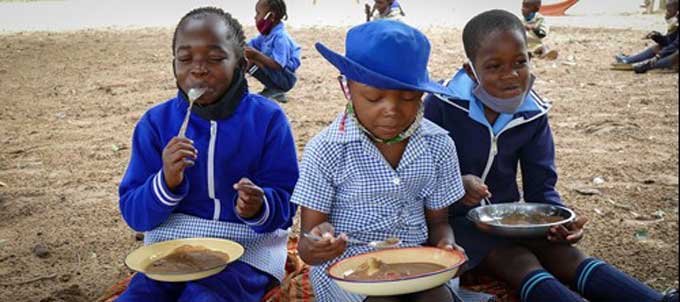
Silethemba Moyo from Gwanda has ‘acquired’ an unusual skill of identifying vehicles carrying food aid by their sound long before they appear.
This saves Moyo the distress of seeing her grandchildren coming back empty-handed from the business centre where food hand-outs are delivered by non-governmental organisations (NGOs).
Moyo cannot visit the fields to till the land because of a disability and has been surviving on food aid.
“I can tell if it’s a haulage truck or bus from a distance with ease. Most of the haulage trucks will be carrying food aid,” Moyo said.
“I receive food from Nkomwa Foundation Trust and it really helps me. My grandchildren are attending school under the Beam programme.”
Moyo said she doesn’t know how she will survive when the Trust is forced to stop operations.
Elsewhere in rural Gwanda, Asithuthukeni — a Matabeleland South-based youth organisation — distributes free sanitary wear in various districts.
Violet Dube from Gwanda is one of the beneficiaries.
- Chamisa under fire over US$120K donation
- Mavhunga puts DeMbare into Chibuku quarterfinals
- Pension funds bet on Cabora Bassa oilfields
- Councils defy govt fire tender directive
Keep Reading
“I was able to get pads for a year’s supply from Asithuthukeni 2021 and I’m still using them. If it wasn’t for this intervention I don’t know what I could have done as sanitary ware is expensive,” said Dube.
Dube and Moyo are among the many people in the province who have benefited from NGO social welfare schemes targeting widows and other vulnerable groups.
Some of the NGOs run supplementary feeding schemes mainly at schools and in poor communities.
But these NGOs face an uncertain future following plans by the central government to amend the Private Voluntary Organisations (PVO) Bill, alleging political bias.
For locals who rely on humanitarian support, the government’s mooted PVO Bill signals the end to food aid which has kept many poor families in Matabeleland South’s Gwanda area alive for several decades
The Bill seeks to amend the Private Voluntary Organisations Act, giving the State unfettered powers to snoop into operations of Civic Society Organisations (CSOs), Trust and other humanitarian organisations providing charitable services.
A research commissioned by the Zimbabwe Human Rights NGO Forum in collaboration with the Southern Defenders and Accountability Lab in February reveals that NGOs spend as much as US$800 million annually on social support schemes targeting women and other vulnerable groups.
Government only provides less than US$100 million for social support programmes that includes health, education, water and sanitation, among others, according to World Bank statistics.
“For instance, according to the 2022 national budget statement, during the period of January to September 2021, the country received development assistance amounting to US$647.8 million, of which US$401.9 million was from bilateral partners and US$245.9 million from multilateral partners,” the report reads.
Nkomwa Foundation Trust founder Pick Nkomwa said she was worried for the beneficiaries if the bill sails through.
“It is with great concern that we fear that the adoption of the Bill, with its current propositions, will dampen the spirits of donors and well-wishers,” Nkomwa said.
Nkomwa’s organisation relies on donations from local and international partners to continue providing support to people with disabilities and the disadvantaged.
“We are gravely concerned with the stringent and cumbersome PVO registration process,” Mkomwa added.
“We are in full support of the need to have a framework to provide clear laws towards preventing any potential abuse of and by private voluntary organisations but it has to be convenient to the PVOs.”
The government has defended the Bill as necessary to comply with recommendations made by the Financial Action Task Force on money-laundering and terrorist funding
But Alice Masawi from the Women Coalition of Zimbabwe shares Nkomwa’s fears.
“The central government does not have enough money to cover all groups that need assistance. Many people will be affected if this intervention ends, especially the vulnerable groups,” said Masawi.
Masawi’s organization supports the underprivileged including the disabled with legal assistance as well as offering shelter to victims of sexual abuse.
“It is sad that such an important lifeline of humanitarian aid particularly for children might be cut off, putting the children at ever greater risk,” Masawi added.
* This article was originally published by The Citizen Bulletin, a nonprofit news organisation that produces hard-hitting, hyperlocal reporting and analysis for the southwestern region of Matabeleland.











